(Fun fact: this is my 100th blog post! Woo hoo!)
Such a busy day today! I got to accomplish something that I’ve
always wanted to do, grapple with religious questions, and play with mud. It
has been an excellent day.
I’m going to stop posting food pictures, since I think everyone
(including future-Christine) now gets the flair of what food it. Lots of bread,
lots of hummus. I did have a nice piece of watermelon today, though, and the
white jelly returned to mock me. Oh, white jelly. Will I ever learn your
flavouring?
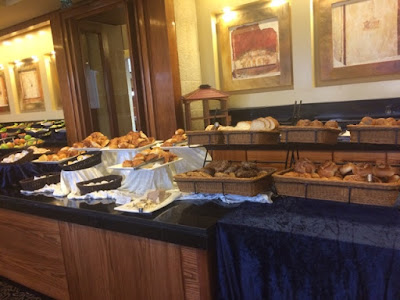 |
| Just LOOK at all those different types of breads |
There was a slight switch with the schedule today, since a
storm was coming, so we went to the Dead Sea area today. When it rains around
here, everything flows into the Dead Sea (makes sense, since the Dead Sea is so
low down), so the roads often flood and close and there can be flash floods in
the area. It is better to go when there is no rain. So off we went! Jerusalem
tour will now be tomorrow.
Jerusalem is about 200 meters above sea level, and we dropped
to about 400 meters below sea level, so it is quite a drop in only a thirty minute
drive. My ears needed to pop, but they didn’t initially, which made our first
stop a bit frustrating. We went to Queram, which is a bunch of caves around the
Dead Sea where the Dead Sea scrolls were discovered.
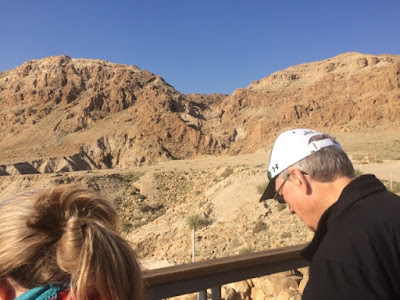 |
| The Dead Sea scrolls were discovered in those caves |
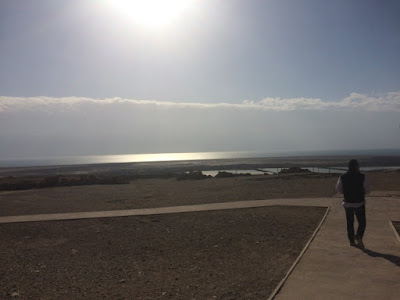 |
| Overlooking the Dead Sea. That's Jordan on the other side! |
The Yahad sect (we saw a video about them) was
hyper-religious; you had to ritually bathe twice a day, and it sort of operated
like a commune. But they knew how to store scrolls, which is what they are
known for now.
This area was much more like how I imagined Israel—dry, a
little dusty, and without much greenery. The Dead Sea is so called because
nothing can live in it—everything is dead. The area certainly matches that
description. Part of the reason it is so salty (30% saltier than the ocean) is
because there is no outlet; everything pools together, dissolves salt, and just
sits there. The sea has been drying up, though, and the area that used to be
wet is now liable to become a sink hole when fresh water attacks.
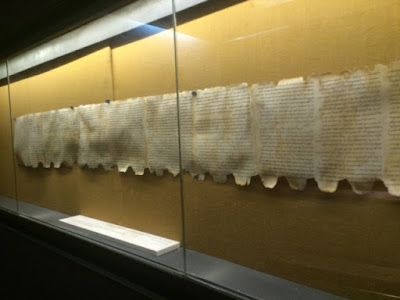 |
| A copy of one of the scrolls |
After Queram, we went to the Dead Sea! I remember my seventh
grade history teacher telling us about his experience, swimming in the Dead
Sea, and it got me excited about trying to do so as well. But I never really
thought that I would get my chance to go. Well, guess what: I got my chance!
 |
| The beach was like a resort |
(Not too many pictures, since I was swimming, and the photos
people took of me were on someone else’s phone. But they exist and I will be
getting a copy of the eventually.)
The water was pretty choppy, with the wind from the storm,
so it made little waves. That, combined with the sliminess of the mud at the
bottom of the sea, made it very hard to walk out there without tripping. The
bottom isn’t smooth, but bumpy, and it rises and falls and goes from clay to
rock formations. Eventually I got to lie back and just bump around in the water.
It was kind of like being a fresh egg in a pot of water—you just naturally
float around! Whee!
I put some mud on one of my arms (using the other arm as a
control) and my face, to try out it’s special Dead Sea skin abilities. The
issue was that with the choppiness of the water, my hair got wet, and so the
mud kept on wanting to trickle into my eyes—of course, I couldn’t rub my eyes,
because everything was so salty! Argh. I just had to keep my head down and try
to shake the droplets away.
When I got out of the Dead Sea, I rinsed off a few times
(de-salination, I suppose), and felt my face and arm. It does indeed feel
smoother! It was like a gentle exfoliant. So yes, people, the Dead Sea is
amazing for your skin. I can independently confirm this as factual!
 |
| Do I look any younger? |
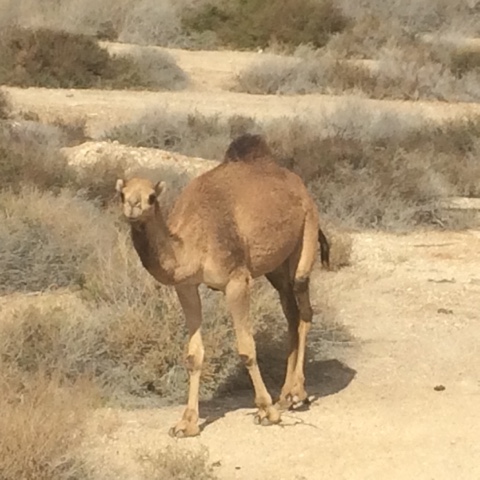 |
| Some camels came right up to our tour bus
|
After lunch (there was Israeli Chinese food on the menu, which I skipped and maybe should have tried, but it just didn’t look that appetizing), we traveled off to En Gedi. I mostly knew of the oasis from Song of Songs (cue a wolf-whistle or some other scandalous noise), but this was also an oasis used when Saul had to go to the bathroom and David cut some of his robes off. There is probably a deep and meaningful connection between these two events, but I can’t think of it.
Our final stop for the day was Masada. Masada was the site
of King Herod’s fortress, which he built to flee to in case of rebellion (at
least he was aware that he was a terrible ruler…), but also notable for the
rebellion in 73AD, when some Jews fled to Masada from Jerusalem. Romans
followed them and were about to attack, but the night before the men got
together and killed the women and children before dying themselves. Thus,
nobody was left to fight--or more importantly, capture and enslave.
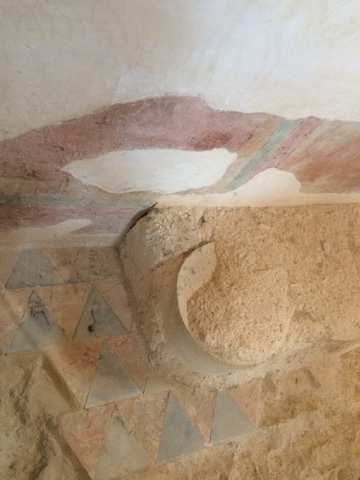 |
| King Herod's Bathtub. You can see the tile on the floor and the decorated plaster from the sides. That's the original! |
 |
| The Roman Camp |
Is it a victory? I don’t know. On one hand, it is true, that
you are not ending your lives as slaves. But you aren’t doing anything against
the Romans either. Wouldn’t the more heroic thing have been to fought as long
as possible? Apparently, Israelis are quite divided on how to view Masada, but
the propaganda seems to be approving, and I’m not quite sure I agree with that. Besides, the women and children didn't get a choice, so that definitely seems like murder to me.
We went back to the hotel, a little bit early (so I could
work on my earlier blog post, which is here and now backdated), and then had
dinner. There was a lecture about the Israel/Palestine conflict, which I considered
going to, but ultimately didn’t because A., we started having a really good
conversation about God and Masada and the Old and new Covenants over dinner,
and B., we had received so much of the Israeli perspective by this point that I
wasn’t sure I wanted any more. I’m feeling that everything I have heard so far
is very one-sided. But I’ll post more about that when I get home.
 |
| We passed Jericho on the way back. It's the lowest and longest-inhabited city in the world! It's now controlled by Palestine, so we can't go in |
 |
| A Palestinian settlement along the freeway. |
Now it is raining and it looks like we made the right choice
by doing the Dead Sea. Tomorrow we will tour Jerusalem and get wet. It should
be a good time!



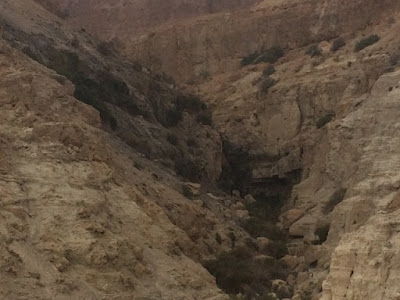
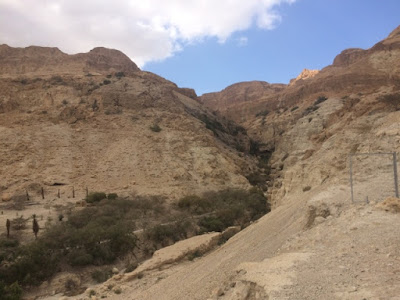


No comments:
Post a Comment